Headline News Archive
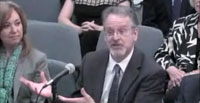 April 23, 2014 - On April 22, Dr. Frederick Bloetscher (FAU) testified to the Science and Space Sub-committee of the Commerce, Science and Transportation committee for the US Senate on the impacts of sea level rise. He noted that occasional flooding is not new to Florida, but the increasing frequency we currently experience is related to sea level rise, not just along the coast, but for large expanses of developed property inland due to topography and groundwater levels. As a result, the challenge for water managers in the state, especially in southeast Florida, is to control the groundwater table, because control of the water table is essential to prevent flooding of the low terrain. He noted that in Miami Beach, as elsewhere in Florida, the lowest lying areas are the roadways, which are also the location of electrical, water, sewer, phone and drainage infrastructure. Fortunately given the current Federally funded special imagery and NOAA data systems we are able to predict pretty accurately where flooding will occur. Linking that information with our detailed projections of sea level rise impacts we can begin now to map vulnerability and build adaptive measures into every action and plan we undertake.
April 23, 2014 - On April 22, Dr. Frederick Bloetscher (FAU) testified to the Science and Space Sub-committee of the Commerce, Science and Transportation committee for the US Senate on the impacts of sea level rise. He noted that occasional flooding is not new to Florida, but the increasing frequency we currently experience is related to sea level rise, not just along the coast, but for large expanses of developed property inland due to topography and groundwater levels. As a result, the challenge for water managers in the state, especially in southeast Florida, is to control the groundwater table, because control of the water table is essential to prevent flooding of the low terrain. He noted that in Miami Beach, as elsewhere in Florida, the lowest lying areas are the roadways, which are also the location of electrical, water, sewer, phone and drainage infrastructure. Fortunately given the current Federally funded special imagery and NOAA data systems we are able to predict pretty accurately where flooding will occur. Linking that information with our detailed projections of sea level rise impacts we can begin now to map vulnerability and build adaptive measures into every action and plan we undertake. He noted that he is positive on Florida’s future. Our best option is adaptation and there are many options available - for example we can install more coastal salinity structures, raise road beds, abandon some local roads, increase storm water pumping, add storm water retention etc. to address many of the problems. FAU has developed a toolbox of these options that can be applied to address these adaptation demands, resulting in an approach that will need a more managed integrated water system, more operations and inevitably more dollars. Much of the actual needs are local, but the problem is regional and requires a concerted effort of federal, state and local agencies and the private sector to address the scales of the problem. A community can address the local problems, but the regional canals, barriers, etc., are beyond the scope of individual agencies. Collaboration and discussion are needed. The Four County Compact is an excellent example, but the longer term solutions need the state and federal agencies and the related dollars to address larger impacts.
The needs will be large - in the tens of billions. But there are two things in south Florida’s favor – time and money. The expenditures are over many, many years. Most important in the near term need is the early planning and identification of critical components of infrastructure and policy needs and timing for same. At risk are nearly 6 million of Floridians their economy and lifestyle, $3.7 trillion in property (2012) in south east Florida alone and a $260 billion annual economy. All of these are expected to continue to increase assuming the appropriate plans are made to adapt to the changing sea level. Protection of the area for the next 100-150 years is achievable as long as we have the science, the understanding and the will to do it. Plan now, and over the rest of this century starting now we can raise those billions of dollars needed.
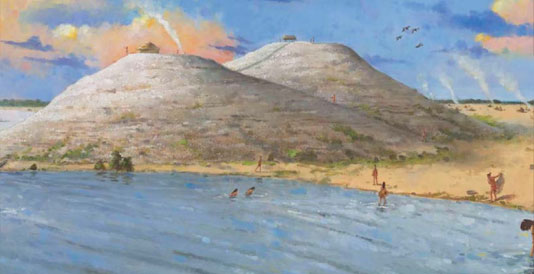 April 17, 2014 - In collaboration with the National Park Service and local educators, researchers from Dr. Linda Walter's biology lab at the University of Central Florida, has produced a book entitled We Will Remember Turtle Mound: Uncovering the Past and Saving the Future of Florida’s First People. This book, geared toward fourth grade curriculum, tells the story of the Timucuan people and Turtle Mound, one of the largest coastal shell middens on the east coast. After describing the past, it tells about recent losses of artifacts due to climate change and “living shoreline” efforts to preserve and protect the midden into the future.
April 17, 2014 - In collaboration with the National Park Service and local educators, researchers from Dr. Linda Walter's biology lab at the University of Central Florida, has produced a book entitled We Will Remember Turtle Mound: Uncovering the Past and Saving the Future of Florida’s First People. This book, geared toward fourth grade curriculum, tells the story of the Timucuan people and Turtle Mound, one of the largest coastal shell middens on the east coast. After describing the past, it tells about recent losses of artifacts due to climate change and “living shoreline” efforts to preserve and protect the midden into the future.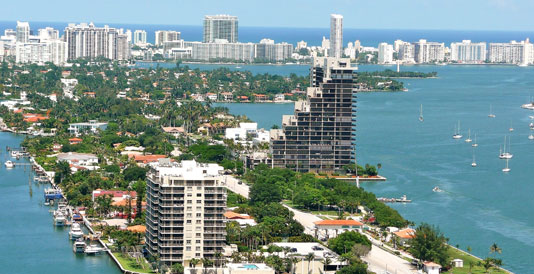 April 15, 2014 - Miami could know as early as 2020 how high sea levels will rise into the next century, according to a team of researchers including Florida International University scientist René Price. Price and a team of international researchers analyzed data from 10 sea level monitoring stations throughout the world. They examined historical data to identify the timing at which accelerations might first be recognized in a significant manner and extended projections through 2100. The findings are published in this week's issue of the journal Nature Communications.
April 15, 2014 - Miami could know as early as 2020 how high sea levels will rise into the next century, according to a team of researchers including Florida International University scientist René Price. Price and a team of international researchers analyzed data from 10 sea level monitoring stations throughout the world. They examined historical data to identify the timing at which accelerations might first be recognized in a significant manner and extended projections through 2100. The findings are published in this week's issue of the journal Nature Communications.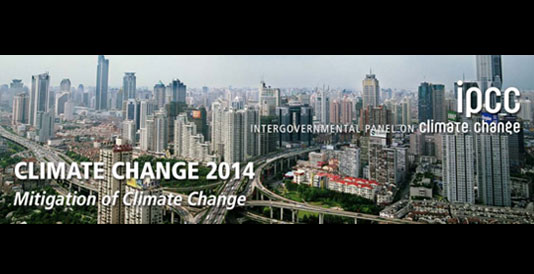 April 14, 2014 - Concluding four years of intense scientific collaboration by hundreds of authors from around the world, this report responds to the request of the world's governments for a comprehensive, objective and policy neutral assessment of the current scientific knowledge on mitigating climate change. The report has been extensively reviewed by experts and governments to ensure quality and comprehensiveness. The quintessence of this work, the Summary for Policymakers, has been approved line by line by member governments at the 12th Session of IPCC WG III in Berlin, Germany (7-11 April 2014).
April 14, 2014 - Concluding four years of intense scientific collaboration by hundreds of authors from around the world, this report responds to the request of the world's governments for a comprehensive, objective and policy neutral assessment of the current scientific knowledge on mitigating climate change. The report has been extensively reviewed by experts and governments to ensure quality and comprehensiveness. The quintessence of this work, the Summary for Policymakers, has been approved line by line by member governments at the 12th Session of IPCC WG III in Berlin, Germany (7-11 April 2014).Access the Full Report (will be available by April 15, 2014)
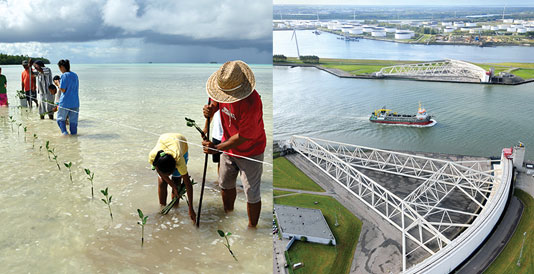 April 1, 2014 - The Intergovernmental Panel on Climate Change (IPCC) Working Group II has released a report titled Climate Change 2014: Impacts, Adaptation, and Vulnerability. The objective of this contribution of Working Group II to the IPCC's Fifth Assessment Report is to consider the vulnerability and exposure of human and natural systems, the observed impacts and future risks of climate change, and the potential for and limits to adaptation. The chapters of the report assess risks and opportunities for societies, economies, and ecosystems around the world. The 30-chapter report is divided into two volumes. Volume I focuses on global and sectoral aspects. It introduces the report with chapters that provide the context for the AR5, followed by those on natural and managed resources and systems; human settlements, industry, and infrastructure; and human health, well-being, and security. Volume I has a set of four chapters on adaptation. The final three chapters in Volume I synthesize information from Volume I and II chapters to provide multi-sector impacts, risks, vulnerabilities, and opportunities. Volume II chapters provide assessments on regions.
April 1, 2014 - The Intergovernmental Panel on Climate Change (IPCC) Working Group II has released a report titled Climate Change 2014: Impacts, Adaptation, and Vulnerability. The objective of this contribution of Working Group II to the IPCC's Fifth Assessment Report is to consider the vulnerability and exposure of human and natural systems, the observed impacts and future risks of climate change, and the potential for and limits to adaptation. The chapters of the report assess risks and opportunities for societies, economies, and ecosystems around the world. The 30-chapter report is divided into two volumes. Volume I focuses on global and sectoral aspects. It introduces the report with chapters that provide the context for the AR5, followed by those on natural and managed resources and systems; human settlements, industry, and infrastructure; and human health, well-being, and security. Volume I has a set of four chapters on adaptation. The final three chapters in Volume I synthesize information from Volume I and II chapters to provide multi-sector impacts, risks, vulnerabilities, and opportunities. Volume II chapters provide assessments on regions.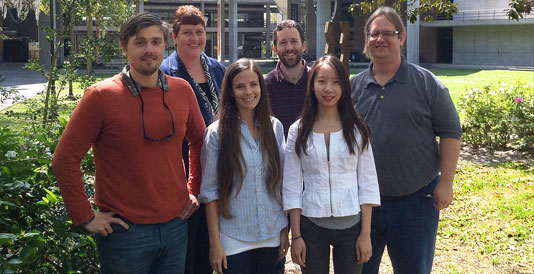 March 26, 2014 - An interdisciplinary team at the University of Florida's College of Design, Construction and Planning has won the American' Planning Association's (APA) Excellence in Small Town and Rural Planning - Student Project Award. The APA's Small Town and Rural Division will present the award to the team at the national APA conference in Atlanta in late April 2014. Information about the team’s winning project, "Yankeetown-Inglis Adaptive Design," and a link to the final report are at http://changinglevycoast.org/2014/01/03/yankeetown-inglis-adaptive-design-report/. This project was part of the two-year "Planning for Coastal Change in Levy County" project focusing on the issue of sea level rise and funded by the Florida Sea Grant (http://changinglevycoast.org). The student team was: Sean Reiss (Urban and Regional Planning), Rong Zeng (Urban and Regional Planning), Jana Rosenbloom (Landscape Architecture), and Kevin Bennett (Building Construction). Advisors were: Kathryn Frank (Urban and Regional Planning) and Michael Volk (Center for Landscape Conservation Planning). The award comes with a $200 subsidy for travel to the national conference.
March 26, 2014 - An interdisciplinary team at the University of Florida's College of Design, Construction and Planning has won the American' Planning Association's (APA) Excellence in Small Town and Rural Planning - Student Project Award. The APA's Small Town and Rural Division will present the award to the team at the national APA conference in Atlanta in late April 2014. Information about the team’s winning project, "Yankeetown-Inglis Adaptive Design," and a link to the final report are at http://changinglevycoast.org/2014/01/03/yankeetown-inglis-adaptive-design-report/. This project was part of the two-year "Planning for Coastal Change in Levy County" project focusing on the issue of sea level rise and funded by the Florida Sea Grant (http://changinglevycoast.org). The student team was: Sean Reiss (Urban and Regional Planning), Rong Zeng (Urban and Regional Planning), Jana Rosenbloom (Landscape Architecture), and Kevin Bennett (Building Construction). Advisors were: Kathryn Frank (Urban and Regional Planning) and Michael Volk (Center for Landscape Conservation Planning). The award comes with a $200 subsidy for travel to the national conference.
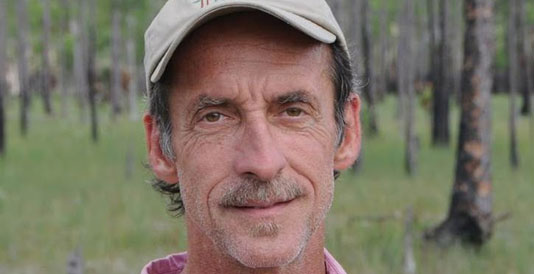 March 26, 2014 - Dr. Reed Noss, a co-director of the FCI at the University of Central Florida (UCF), has been named a UCF "Pegasus Professor." The award is the most prestigious a faculty member can receive at UCF. The honor recognizes extraordinary contributions to the UCF community through teaching, research and service. Each recipient receives a statue of the UCF Pegasus, a gold Pegasus Professor medallion and a check for $5,000.
March 26, 2014 - Dr. Reed Noss, a co-director of the FCI at the University of Central Florida (UCF), has been named a UCF "Pegasus Professor." The award is the most prestigious a faculty member can receive at UCF. The honor recognizes extraordinary contributions to the UCF community through teaching, research and service. Each recipient receives a statue of the UCF Pegasus, a gold Pegasus Professor medallion and a check for $5,000. Dr. Noss directs UCF's SPICE (Science and Planning in Conservation Ecology) Lab and is President and Chief Scientist for the Florida Institute for Conservation Science. He currently conducts research on vulnerability of species and ecosystems to sea-level rise; climate adaptation strategies; road ecology; ecosystem conservation; and changes in ecological processes and species assemblages along urban-rural-wildland gradients. His latest book is Forgotten Grasslands of the South: Natural History and Conservation.
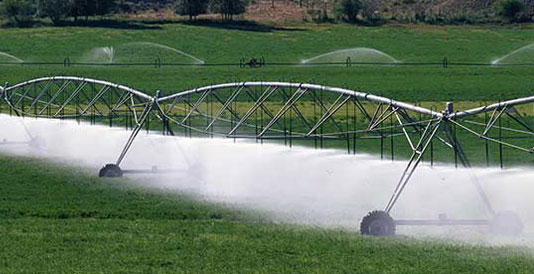 March 26, 2014 - A new University of Florida web-based tool worked well during its trial run to measure water consumption at farms in four Southern states. The system measures the “water footprint” of a farm, which is a measure of the consumptive water use required to produce a crop. Water footprint is described in units of water volume used relative to mass of produce (gallons/lb or liters/kg). The tool was developed by Daniel Dourte, Clyde Fraisse, and Oxana Uryasev through AgroClimate.
March 26, 2014 - A new University of Florida web-based tool worked well during its trial run to measure water consumption at farms in four Southern states. The system measures the “water footprint” of a farm, which is a measure of the consumptive water use required to produce a crop. Water footprint is described in units of water volume used relative to mass of produce (gallons/lb or liters/kg). The tool was developed by Daniel Dourte, Clyde Fraisse, and Oxana Uryasev through AgroClimate.Water Footprint Calculator
Southeast Farm Press article
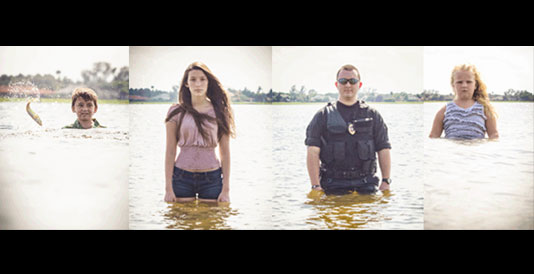 February 28, 2014 - The Kresge Foundation is funding Florida research with a two year, $250,000 Grant to The Florida Public Health Institute (FPHI) and Florida Atlantic University (FAU). FPHI is working to establish public health as a primary consideration in sea-level rise adaptation planning efforts and will partner with researchers from FAU to identify and model the health impacts of sea-level rise on South Florida residents. For information about this project, please contact Nicole Hammer at This email address is being protected from spambots. You need JavaScript enabled to view it..
February 28, 2014 - The Kresge Foundation is funding Florida research with a two year, $250,000 Grant to The Florida Public Health Institute (FPHI) and Florida Atlantic University (FAU). FPHI is working to establish public health as a primary consideration in sea-level rise adaptation planning efforts and will partner with researchers from FAU to identify and model the health impacts of sea-level rise on South Florida residents. For information about this project, please contact Nicole Hammer at This email address is being protected from spambots. You need JavaScript enabled to view it..
 February 28, 2014 - The Florida Center for Environmental Studies (CES) at Florida Atlantic University with its partners, the CLEO Institute, the Good Government Initiative, UCS and WRI recently collaborated to host a workshop for 40 local elected officials in Miami-Dade County, FL. The workshop presented the impacts of sea-level rise and climate change science in an interactive format. The workshop goal was to increase local decision-makers’ understanding of impending sea level rise issues in their communities. The workshop provided a tool kit with key points to help them make informed decision, increase their support, and implement plans to address the impacts of climate change. CES is seeking funding to replicate this successful model in other Florida counties. For information please contact Nicole Hammer at This email address is being protected from spambots. You need JavaScript enabled to view it..
February 28, 2014 - The Florida Center for Environmental Studies (CES) at Florida Atlantic University with its partners, the CLEO Institute, the Good Government Initiative, UCS and WRI recently collaborated to host a workshop for 40 local elected officials in Miami-Dade County, FL. The workshop presented the impacts of sea-level rise and climate change science in an interactive format. The workshop goal was to increase local decision-makers’ understanding of impending sea level rise issues in their communities. The workshop provided a tool kit with key points to help them make informed decision, increase their support, and implement plans to address the impacts of climate change. CES is seeking funding to replicate this successful model in other Florida counties. For information please contact Nicole Hammer at This email address is being protected from spambots. You need JavaScript enabled to view it..
 February 25, 2014 - The AgroClimate Mobile app is an innovative way to help Florida growers make more informed decisions based on weather and climate information. Growers can check current weather conditions at FAWN weather stations and summarize observations during the last 7, 14 and 30 days. They can also register farms and fields for customized reports based on crop, planting /start date, soil texture and irrigation management.
February 25, 2014 - The AgroClimate Mobile app is an innovative way to help Florida growers make more informed decisions based on weather and climate information. Growers can check current weather conditions at FAWN weather stations and summarize observations during the last 7, 14 and 30 days. They can also register farms and fields for customized reports based on crop, planting /start date, soil texture and irrigation management.Download PDF flyer
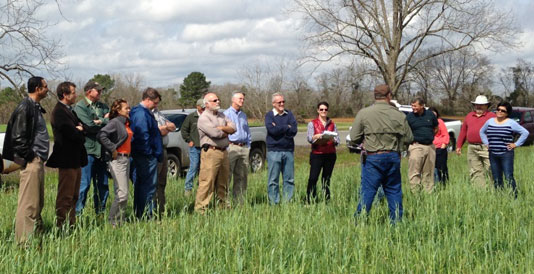 February 24, 2014 - The FCI-supported Tri-state climate learning community for row crop agriculture held their ninth workshop on Feb. 20th in Headland, Alabama at the Wiregrass Research Station. Twenty-seven people attended, including producers, researchers and extension professionals from 12 counties in FL, GA and AL. The morning fieldtrip was organized by William Birdsong (Auburn University Cooperative Extension) and highlighted climate-related risk management at the Satsuma orchard of Hertzog farms. During an additional two other farm visits producers, Myron Johnson and Thomas Kirkland guided the group in a discussion about the benefits and practices associated with cover crops (hairy vetch and cereal rye). David Zierden, FL state climatologist (FSU) provided a seasonal climate review and outlook. Growers were particularly interested in hearing about the physical drivers responsible for recent cold weather. David also piqued interest in learning more about the theory of arctic amplification.
February 24, 2014 - The FCI-supported Tri-state climate learning community for row crop agriculture held their ninth workshop on Feb. 20th in Headland, Alabama at the Wiregrass Research Station. Twenty-seven people attended, including producers, researchers and extension professionals from 12 counties in FL, GA and AL. The morning fieldtrip was organized by William Birdsong (Auburn University Cooperative Extension) and highlighted climate-related risk management at the Satsuma orchard of Hertzog farms. During an additional two other farm visits producers, Myron Johnson and Thomas Kirkland guided the group in a discussion about the benefits and practices associated with cover crops (hairy vetch and cereal rye). David Zierden, FL state climatologist (FSU) provided a seasonal climate review and outlook. Growers were particularly interested in hearing about the physical drivers responsible for recent cold weather. David also piqued interest in learning more about the theory of arctic amplification.The Tri-state climate group was initiated in April 2010 and is coordinated by Dr. Wendy-Lin Bartels, Assistant Research Scientist at FCI. Row crop stakeholders meet twice a year in Florida, Alabama or Georgia in February (prior to planting) and in early August during summer “downtime” (prior to harvest). The broad aim of this climate learning network is to create a space for on-going interactions among row crop stakeholders at a regional scale (SE USA) to identify and assess adaptation options that can reduce climate-related risks. Workshops emphasize hands-on, peer-to-peer learning through on-farm field visits, in-depth discussions, and experimentation. Interactions enable local experiences to influence research directions (and vice versa). Researchers from the Florida Climate Institute and the Southeast Climate Consortium coordinate and facilitate the group with support through a USDA-NIFA-funded project.
For more information, visit http://www.agroclimate.org/seclimate/row-crop-climate-group/ or email This email address is being protected from spambots. You need JavaScript enabled to view it..
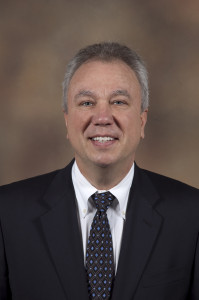 January 29, 2014 - Dr. Scott Hagen, branch director of the Florida Climate Institute at the University of Central Florida, has been elected a fellow of the American Society of Civil Engineers (ASCE). Dr. Hagen is a professor at the University of Central Florida and a member of the Board of Governors for the ASCE Coasts, Oceans, Ports & Rivers Institute. Hagen established and directs the internationally recognized Coastal Hydroscience Analysis, Modeling & Predictive Simulations Laboratory. The primary focus is on massively parallel, high-performance computational modeling of ocean, coastal, and inland shallow water flows. Hagen’s recent efforts expand into transport and biological modeling, particularly with respect to the coastal dynamics of sea-level rise, and are aiding coastal planners around Florida. He also served as guest editor of a focus issue on sea-level rise implications to coastal engineering for the ASCE Journal of Waterway, Port, Coastal, and Ocean Engineering. In 2012 he chaired the 10th International Conference on Hydroscience & Engineering, where he received the Outstanding Achievement Award for Advancement of the State-of-the-Art.
January 29, 2014 - Dr. Scott Hagen, branch director of the Florida Climate Institute at the University of Central Florida, has been elected a fellow of the American Society of Civil Engineers (ASCE). Dr. Hagen is a professor at the University of Central Florida and a member of the Board of Governors for the ASCE Coasts, Oceans, Ports & Rivers Institute. Hagen established and directs the internationally recognized Coastal Hydroscience Analysis, Modeling & Predictive Simulations Laboratory. The primary focus is on massively parallel, high-performance computational modeling of ocean, coastal, and inland shallow water flows. Hagen’s recent efforts expand into transport and biological modeling, particularly with respect to the coastal dynamics of sea-level rise, and are aiding coastal planners around Florida. He also served as guest editor of a focus issue on sea-level rise implications to coastal engineering for the ASCE Journal of Waterway, Port, Coastal, and Ocean Engineering. In 2012 he chaired the 10th International Conference on Hydroscience & Engineering, where he received the Outstanding Achievement Award for Advancement of the State-of-the-Art.
 January 29, 2014 - There are approximately 1 billion biodiversity research specimens in US collections alone, but it is estimated that information from just 10% of them is currently digitized and online. Digitization of the specimens grants researchers access to vast quantities of information in their investigations of timely subjects such as climate change, invasive species, and the extinction crisis.
January 29, 2014 - There are approximately 1 billion biodiversity research specimens in US collections alone, but it is estimated that information from just 10% of them is currently digitized and online. Digitization of the specimens grants researchers access to vast quantities of information in their investigations of timely subjects such as climate change, invasive species, and the extinction crisis. About 20,000 specimen images from Florida State University's Robert K. Godfrey Herbarium and Valdosta State University's Herbarium are currently featured on a new crowdsourcing site called Notes From Nature (http://www.notesfromnature.org/). Notes from Nature is part of the Zooniverse suite of projects (https://www.zooniverse.org/), which have previously focused on astronomy but which has expanded to include climate, humanities, and life sciences research. Another climate-related crowdsourcing project in Zooniverse is the popular Old Weather project (http://www.oldweather.org/).
If you have a moment to check out Notes from Nature and transcribe label data from a few specimens, it'd be great (it's fun!). To learn more about the herbarium at FSU, you can visit herbarium.bio.fsu.edu or read the blog post about the Robert K. Godfrey Herbarium at http://blog.notesfromnature.org/2013/04/28/featured-collection-fsus-robert-k-godfrey-herbarium/. To learn more about the herbarium at Valdosta, you can visit http://ww2.valdosta.edu/~rcarter/herbintro.htm; Richard Carter at Valdosta will post to the Notes from Nature blog soon.
The Director of FSU's Robert K. Godfrey Herbarium, Austin Mast (This email address is being protected from spambots. You need JavaScript enabled to view it.), is a member of the steering committee of Notes from Nature. He would be very pleased to receive constructive comments on the interface.
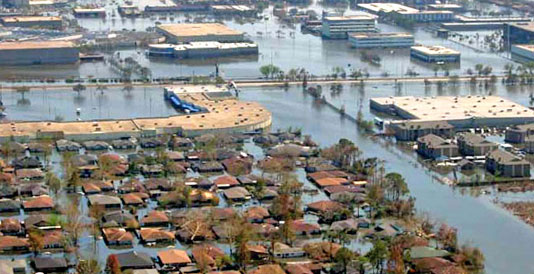 January 23, 2014 - A new paper co-authored by Drs. Thomas Wahl, Francisco Calafat, and Mark Luther and accepted in the Geophysical Research Letters journal finds evidence of rapid changes in seasonal sea level cycles along the US Gulf coast, which in turn increases the risk of hurricane-induced flooding in certain areas.
January 23, 2014 - A new paper co-authored by Drs. Thomas Wahl, Francisco Calafat, and Mark Luther and accepted in the Geophysical Research Letters journal finds evidence of rapid changes in seasonal sea level cycles along the US Gulf coast, which in turn increases the risk of hurricane-induced flooding in certain areas. Geophysical Research Letters Journal Article
Nature News Article
American Geophysical Union Press Release
Tampa Bay Times News Article
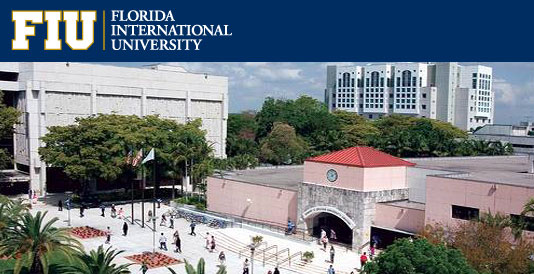 December 19, 2013 - We are pleased to announce that Florida International University (FIU) has joined the FCI! FIU is located in the Greater Miami area and is part of the State University System of Florida. The primary FCI contacts from FIU are Dr. Richard Olson, Director of Extreme Events Research and Professor in the Department of Politics & International Relations, and Dr. Michael Sukop, Associate Professor in the Department of Earth and Environment.
December 19, 2013 - We are pleased to announce that Florida International University (FIU) has joined the FCI! FIU is located in the Greater Miami area and is part of the State University System of Florida. The primary FCI contacts from FIU are Dr. Richard Olson, Director of Extreme Events Research and Professor in the Department of Politics & International Relations, and Dr. Michael Sukop, Associate Professor in the Department of Earth and Environment.
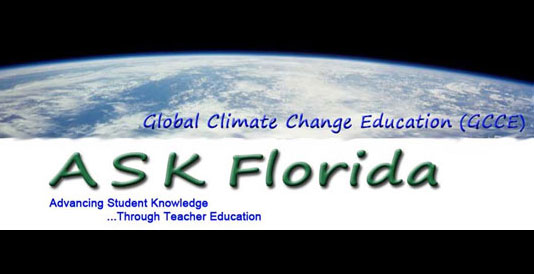 December 18, 2013 - Teaching materials are now available online from a NASA-funded project conducted by the University of South Florida and Florida State University to advance middle-school student knowledge of climate change through teacher education.
December 18, 2013 - Teaching materials are now available online from a NASA-funded project conducted by the University of South Florida and Florida State University to advance middle-school student knowledge of climate change through teacher education. Content and methods were built on current standards and best practice, including K-12 climate literacy standards, national science standards, Florida’s state standards, national PD standards, and content-specific pedagogy, such as inquiry learning and targeting to specific assessment results. The content related local, Florida, and Southeastern U.S. topics to global topics. The major climate change topic areas are Climate Fundamentals, Energy Transfer and Climate, Weather and Climate, Causes of Climate Change, Humans and Climate Change, Hurricanes, Sea Level, and Sinkholes. Effective teaching methods were embedded throughout.
More information: hhttp://coaps.fsu.edu/outreach/ask-florida-climate-education
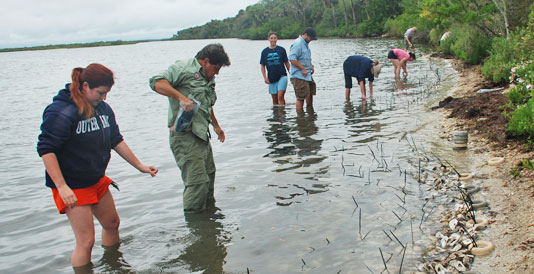 December 19, 2013 - The Southeast Archeological Center (SEAC) of the National Park Service (NPS) has partnered with the Center for Ocean-Atmospheric Prediction Studies (COAPS) at the Florida State University to conduct an assessment of the risks posed by ongoing climate change to cultural resources at national parks in the Southeast. Preliminary studies have identified modern, colonial, and pre-colonial atmospheric and oceanographic data that can be used to assess the risks to irreplaceable cultural resource sites within Canaveral National Seashore and Everglades National Park. At these sites, rising sea level combined with the exposure of the Florida Peninsula to hurricanes are the most prominent risks to cultural resources.
December 19, 2013 - The Southeast Archeological Center (SEAC) of the National Park Service (NPS) has partnered with the Center for Ocean-Atmospheric Prediction Studies (COAPS) at the Florida State University to conduct an assessment of the risks posed by ongoing climate change to cultural resources at national parks in the Southeast. Preliminary studies have identified modern, colonial, and pre-colonial atmospheric and oceanographic data that can be used to assess the risks to irreplaceable cultural resource sites within Canaveral National Seashore and Everglades National Park. At these sites, rising sea level combined with the exposure of the Florida Peninsula to hurricanes are the most prominent risks to cultural resources. A new website provides users access to a wide range of atmospheric and oceanographic data resources. The data will support NPS as they develop strategies for adaptation or mitigation of future climate impacts on cultural resources.
More information: http://coaps.fsu.edu/nps
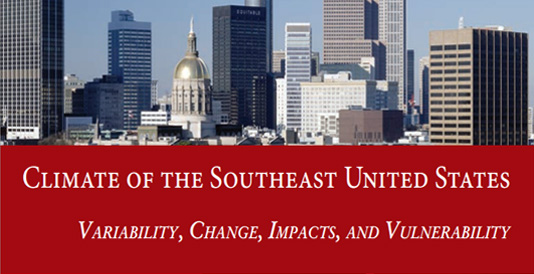 November 13, 2013 - People who live in the southeastern United States should begin to prepare for more drastically changing weather conditions — everything from heat waves to poorer air quality – caused by climate change, according to a new book, edited by a University of Florida researcher. The book, which the FCI's Keith Ingram helped write, is titled “Climate Change of the Southeast United States: Variability, Change, Impacts and Vulnerability.” Ingram was the book’s lead editor.
November 13, 2013 - People who live in the southeastern United States should begin to prepare for more drastically changing weather conditions — everything from heat waves to poorer air quality – caused by climate change, according to a new book, edited by a University of Florida researcher. The book, which the FCI's Keith Ingram helped write, is titled “Climate Change of the Southeast United States: Variability, Change, Impacts and Vulnerability.” Ingram was the book’s lead editor.Source: http://news.ufl.edu/2013/11/13/climate-change-book/












